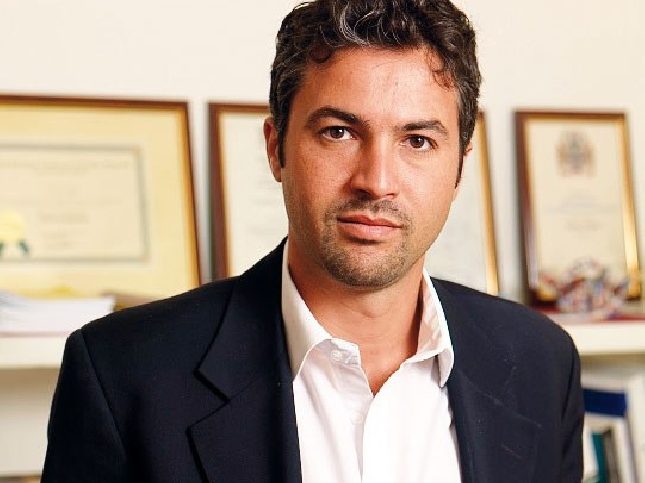No, we weren’t ordered to meow like a cat or bark like a dog, nor did we feel prompted to assassinate a prime minister upon finishing our visit with Dr. Jeremy Alford, Clinical Psychologist and Clinical Hypnotherapist, who also happens to NOT own a gold watch dangling from a long chain. Quite the contrary, upon our visit with Dr. Jeremy, we felt very relaxed and enlightened about a new (or rather old) state of being.
Unfortunately, we have been conditioned by the media to believe that Hypnosis is synonymous with mind control. Upon the mere mention of the term ‘Hypnosis’ we’re transported to scenes from Zoolander, or Inception, where hypnosis is mainly portrayed as a means of twisted brainwashing and evil manipulation. Other people feel challenged by the notion of Hypnosis, refusing to accept that relinquishing control does not amount to the biggest loss or failure. Whether we’ve programmed ourselves to think of the process of Hypnosis as evil, or we simply consider the ideology behind it a mindless joke, there are more positive, rather than negative, implications to this inherent process that are of considerable value to the wellbeing of many people in our society today.
bazaar meets Dr. Jeremy Alford, in an effort to finally dispel the myths concerned with Hypnosis. Dr. Jeremy is specialized in the support and treatment of eating disorders and related issues such as emotional traumas, mood and anxiety disorders, compulsive behaviors, smoking cessation, and other stress related issues.
How is Hypnosis considered a medical treatment?
Throughout various studies taking place in the UK and US during the 1950’s, Hypnosis has been accredited as an effective therapeutic technique. Originally, the integration of Hypnosis into practical medicine occurred as a form of general anesthesia to conduct surgeries. Before modern anesthesia techniques, people used to die because of the pain, and with the use of original Hypnosis practices, also called magnetism, pain management was possible during such surgeries. Since then the inclusion of Hypnosis has evolved in managing neurological and psychological illnesses.
In your opinion, what has caused a shift in the medical community to include Hypnosis as a form of complimentary therapy?
There are several scientific papers since the 1950’s, which have since proven the effectiveness of Hypnosis through the use of technology. Scientists today are able to trace brainwaves through the use of EEG monitors to see changes in the brain patterns as the person is induced into Hypnosis. Once physiological changes are documented, specifically when one is in a hypnotic state, as opposed to when we are in a meditative state, or a conscious state, the medical community concurred the effectiveness of Hypnosis in treatment practices. However, as with most doctors in the field of conventional medicine, not all doctors have the luxury of time to include the processes of Hypnosis. The process of Hypnosis is rather more commonly integrated in various psychological practices and ailments. Moreover, many people choose to undergo Hypnosis in certain physical conditions, as with the popular process of women choosing hypnobirthing techniques rather than undertaking epidurals during childbirth.
Why does someone usually choose to be hypnotized?
I think, typically, hypnotherapy is a notion people would be curious about; the idea of the unknown, as daunting as it might be, is still intriguing. As a clinical psychologist, I also have other therapeutic techniques that include cognitive therapy, which incorporates dialogue and exploration before hypnotherapy. I will only be using clinical hypnotherapy in a very strategic way depending on the problem presented by the client. Normally, clients who visit me are usually undergoing a certain type of emotional difficulty from experiencing certain issues. Perhaps they might have seen other therapists who have explored different approaches, and are looking for an alternative. Because Hypnosis nowadays usually exists as a combined medical approach, they are intrigued to try this new approach.
Who qualifies as an ideal candidate for Hypnosis?
Everybody is hypnotizable, because everybody is suggestible. We are constantly being influenced by external factors, with the media standing as the most prominent example. What people say, how politicians elicit voters, how we are governed in a country or an organization; there are suggestions surrounding us all the time. The essential difference between the way we are naturally hypnotized by our environment and the technical Hypnosis process is that the latter involves very specific techniques that allows you to go into a state of mind that you go into anyways, every single day, but you don’t know its called Hypnosis.
Such ‘hypnoidal states’ occur naturally every day. For example: As you are driving your car and listening to you music, and you suddenly arrive to your destination without realizing how you got there, or how long it took – that is naturally hypnoital. In such a state of focused, yet relaxed distractedness, Hypnosis would involve sending specific messages to prompt you to make a specific desired change. For instance when implementing Hypnosis with pain management, you will be learning to distract your mind from pain.
But, how would one NOT be able to feel pain?
Pain is a relative experience and there is a theory behind it that pain is quite psychological; an interpretation of the brain that a certain part of the body is under stress, which triggers pain as a danger response.
Is Hypnosis a conscious, subconscious, or unconscious experience?
Before explaining the processes of Hypnosis, we need to establish the three parts of the mind. Our conscious mind lives in the present and is resistant to interference and change. Memories are short lived and fleeting due to the barriers of the conscious mind. The subconscious mind acts like the black box of the brain, where memories and experiences acquired throughout life are embedded and knowledge is used to the advantage, or disadvantage, of a person. Finally, the unconscious mind includes the physical body and the mechanisms that are innate to one’s existence and is essentially out of our control, such as sleeping and breathing.
In Hypnosis, we deal with the interactions between the conscious and subconscious mind and essentially through bypassing conscious resistance and going directly to the subconscious mind, one becomes very relaxed, more calm and open to change. One is able to experience suggestions more intensely and clearly and new ideas make more sense. In certain cases, clients may already have this knowledge lying dormant in the subconscious part of the mind, and only a trigger is required to make a change or ‘gain’ the new knowledge. People’s responses tend to vary depending on whether the idea is really new to a person’s subconscious or if it had been a dormant notion, which required a trigger.
Will I remember my session?
Yes in most cases, yet there is the rare case of Spontaneous amnesia, it can happen that you forget a session. There are fluctuations between light and deep mediums, or states of Hypnosis. Your state of Hypnosis is never planned, yet deeper states are always more wanted because they are inductive to physiological changes. Some people might feel like they were never hypnotized, yet by simply having one’s eyes closed while still aware of their surrounding could be deeply hypnotized. Deeper states are more inducive to profound change, and are a much more pleasant experience.
How does it feel like to be hypnotized?
Hypnosis is a very relaxing and pleasant experience, it is considered a relaxed state of awareness. You have a heightened state of concentration, similar to meditation. Yet when guided by someone, the experience is very pleasant and very different from self-instructed meditation.
Most people tend to report that they felt present, aware and not unconscious, yet upon emerging they felt strangely different. People fear the idea of losing control, yet the key is to empower patients to feel that they are in control of the process from the beginning to the end. Hypnosis is a team effort between the hypnotherapist and the participant in an effort to break down barriers formed in our daily lives. The process can be much more empowering for the client by breaking down the barriers that are commonly built nowadays to self-protect. Experiencing Hypnosis is experiencing a natural state of mind that is actually quite universal and common amongst most people, yet we have forgotten about it. Hypnotherapy frightens people due to the negative connotation created by the media and different cultures.
Can Hypnosis help with clients suffering from cases of amnesia?
People who suffer from brain trauma, or accidents can face greater difficulty in recovering their memory, which depends on what degree they had been physically affected. Hypnosis can never fully guarantee a full recovery, as the ailment is purely physiological.
Could Hypnosis cure cases of mild to severe depression?
In the family of anxiety disorders, eating disorders, depressive states, eating related disorders, smoking cessation, Hypnosis is normally a common therapeutic practice alongside other factors. For instance with eating disorders, cognitive behavior therapy is helpful in teaching a person to become more acceptant of themselves. In dealing with feelings more appropriately rather than emotional eating, hypnotherapy considers the physical and psychological aspect of healing, which is a more holistic approach that is conducive to real change.
What are post-hypnotic suggestions and how long will they last after being given while under Hypnosis?
These are affirmations, triggers, or cues that we suggest to the person during Hypnosis that will act as a reminder of the experience, the memory, or the knowledge of the insight acquired during the Hypnosis session. This will allow one to reinforce change that one wants to induce upon them. The same PHS would be taken again in proceeding sessions to act as reinforcement. PHS may occur in a specific situation where the PHS is triggered automatically to recollect the insight gained, and that could be anything from a sound, image to a color. The feeling is one of comfort without a reason, or without making the link to the PHS, as it is assimilated into one’s system and occurs naturally.
Can one practice Hypnosis without the aid of a licensed professional?
No, you would need to be trained. However in three or four sessions one can learn how to apply self-Hypnosis, and this can be considered as a form of meditation.
Tips for reaching a calming, relaxed state at home and on their own?
The basic thing I tell everyone, is that we need to become aware of what we typically take for granted in this life, and that is oxygen. Everything in life is, because there is oxygen. Learning how to breathe deeply by following very specific techniques can allow one to self-regulate, calm down and attend to any problem at hand more efficiently. Breathing deeply creates clarity, this way one can become more focused and enhance their natural capacity for change and adapting to certain situations.
Dr. Alford is available at AlSoor Professional Therapy and Assessment Center on a weekly basis, and is also available at his private practice based in Beirut at the Choices Lebanon center.Dr. Jeremy may also be reached via twitter and facebook, he is also a current member of the Middle East Eating Disorders Association, for more information, please visit, www.meeda.me.
For more information about Dr. Jeremy’s practice at the Choices Center located at the Saifi Village in Beirut, please visit www.choiceslebanon.com.
The Soor Center is the largest private psychology and educational assessment practice in the Middle East and is located in Kuwait City, for more information please visit www.soorcenter.com.








